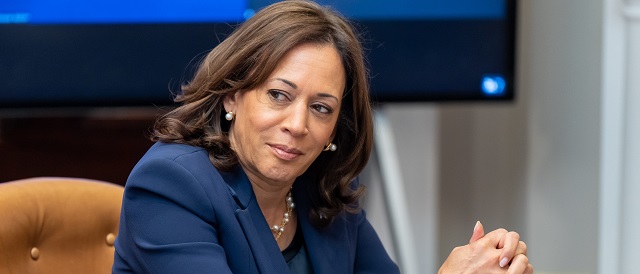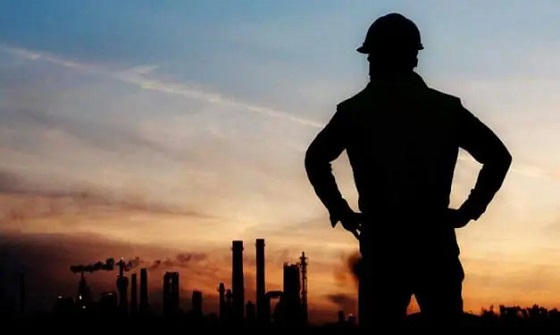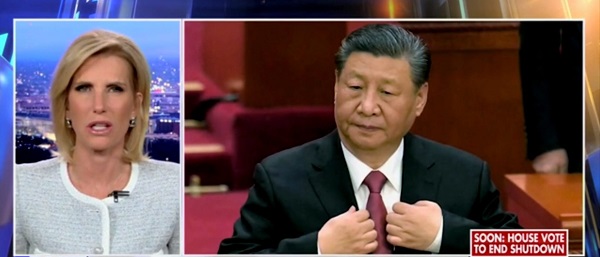Energy
Opinion: A Kamala Harris Presidency Is The Stuff Of Nightmares

 From the Daily Caller News Foundation
From the Daily Caller News Foundation
By PETER MURPHY
Vice President Kamala Harris is one election away from winning the White House and accelerating America’s climate hysteria that is already well underway thanks to the outgoing President Joe Biden.
“There is no question I’m in favor of banning fracking,” then-Sen. Harris said during a CNN-sponsored town hall back in 2019, during her ill-fated run for president.
That same year, she threw her support behind the Green New Deal, proposed by New York Democratic Rep. Alexandria Ocasio-Cortez and Massachusetts Democratic Sen. Ed Markey. That is a plan that would spend trillions of taxpayer dollars to “transition” America from oil, gas and coal sources to so-called wind, solar and batteries–or, rather, to subjugate the nation to an all-powerful green state under the command of the federal government.
Harris later teamed with AOC to introduce the Climate Equity Act, which was a confusing, word-salad of a bill to address climate “injustice” in “front-line communities” using the familiar means of creating a massive new federal bureaucracy.
During Harris’ short-lived campaign for president, which crashed and burned months before the 2020 caucus and primary votes, she called for a climate pollution fee that would “make polluters pay for emitting greenhouse gases into our atmosphere.” Typical of so many climate falsehoods, Harris conflates carbon emissions with “pollution.”
In his letter to the nation last Sunday announcing he was dropping out of the presidential race, President Joe Biden boasted that he had overseen passage of the “most significant climate legislation in the history of the world” — an apparent reference to his misnamed Inflation Reduction Act. This “significant” legislation included hundreds of millions of dollars of corporate welfare for companies to build wind turbines, solar panels and electric vehicles and other climate-related projects.
Because, after all, the U.S. is “the world’s largest historical contributor to climate change – still the second largest today after China’ said a story posted by the climate-rabid media outlet, Yahoo News. Expect a President Harris to double down on such unscientific drivel.
In a modern historical anomaly, Harris is poised to become a major party’s presidential nominee without a single caucus or primary vote, which is a throwback to the old days of party bosses and smoke-filled rooms at convention time.
Still, Harris is among the most privileged Americans to ever become a presidential nominee of a major political party, though not without difficulties. Her parents were both college professors, but they divorced when she was young. Following law school, Harris became a prosecutor in the Alameda County attorney’s office. With the assistance of her politically powerful mentor and very close friend, the charismatic California State Assembly Speaker Willie Brown, she was appointed to several public jobs, elected as San Francisco district attorney, attorney general of California, and then U.S. senator.
After becoming a senator, Harris began running for president. Her 2020 presidential campaign helped reveal her radical positions on climate and a host of other issues and enabled her to get on the short list of vice presidential choices.
With Biden’s mental and physical decline now so obvious, Harris has become the beneficiary of a ninth-inning political coup d’état against the president, engineered by Democratic Party leaders, who pressured him to drop his re-election campaign on the eve of the party’s nominating convention.
Harris is no Scranton-born, working-class pretender, who rode Amtrak. She does not have any record of political centrism, moderation or bipartisanship, which Biden practiced off and on throughout his career and helped him win the presidency in 2020.
By contrast, Harris is a product of the one-party state of California, who supported destructive policies on climate change, energy, crime and welfare that helped spark in California high fuel costs, declining living standards and a population exodus.
The election of 2024 will have climate change on the ballot, as did the 2020 election. The big difference this time is that Americans have experienced more than ever the inflationary and detrimental effects of climate policies with no impact on climate change.
And, it is not a supposed moderate candidate making the climate sale to the public, but a true believer, Kamala Harris.
Peter Murphy is Senior Fellow at the Committee For A Constructive Tomorrow (CFACT), a Washington D.C.-based organization in support of free market, technological solutions to energy and environmental challenges.
Energy
Canada’s oilpatch shows strength amid global oil shakeup

This article supplied by Troy Media.
Global oil markets are stumbling under too much supply and too little demand but Canada’s energy sector is managing to hold its own
Oil prices are sliding under the weight of global oversupply and weakening demand, but Canada’s oilpatch is holding steady—perhaps even thriving—as others flounder.
Crude is piling up in tankers, major producers are flooding the system, and demand is fading fast. According to a Windward report cited by Oilprice.com, the amount of oil held in floating storage—tankers sitting offshore waiting for buyers —has hit record highs. Sanctions on Russian and Iranian crude have sidelined entire fleets. Meanwhile, Middle East cargoes continue to pour in, keeping global supply bloated.
Gunvor CEO Torbjorn Tornqvist called the scale “unprecedented,” warning the market would be flooded overnight if sanctions against Russian and Iran were lifted.
And there’s more coming. U.S. crude production has hit a new record of 13.8 million barrels per day in August. And China’s Changqing oilfield just surpassed 20 million tonnes in cumulative output, and national totals have topped 400 million tonnes of oil equivalent this year. More barrels. More pressure. Less price support.
At the same time, demand is slipping. U.S. gasoline use is down. Global shipping activity has slowed. JPMorgan just trimmed its 2025 oil demand forecast by 300,000 barrels per day. China’s manufacturing sector shrank for the seventh month in a row.
Japan’s purchasing index dropped to an 18-month low. And recession fears are back in the headlines.
OPEC+ tried to calm the chaos by announcing a modest increase in output this December, with a pause on future hikes. But the move didn’t move markets. Then Saudi Arabia cut its selling prices to Asia, a clear signal that the kingdom sees weak demand ahead.
In short, it’s messy out there. But not everywhere.
Amid this global downturn, Canada’s energy sector stands out for one rare quality: resilience. While other producers are scaling back or scrambling to adapt, Canada’s oilpatch is quietly outperforming.
A recent CBC News report highlighted the sector’s staying power and why it’s better positioned than its U.S. counterparts. “The companies that have survived here are the companies that have been able to adapt,” said Patrick O’Rourke, managing director at ATB Capital Markets. “It’s effectively Darwinism.”
It’s also smart design. Canada’s oilsands—primarily in Alberta—are expensive to build but cheap to run. Once the upfront costs are covered, producers can keep pumping for decades with relatively low reinvestment. That means even in a
downturn, output stays strong.
Dane Gregoris of Enverus says Canada’s conventional sector is holding up better than the U.S. shale patch. Why? Canadian oil producers operate more efficiently, with fewer legal and logistical barriers tied to land access and ownership than their U.S. shale counterparts. They also benefit from lower operating costs and are less dependent on relentless drilling just to maintain output.
And now, they finally have a way to get more oil out.
The long-delayed Trans Mountain pipeline expansion is finally complete. It delivers Alberta crude to B.C.’s tidewater and, from there, to Asian markets. That access, once a significant limitation for Canadian producers, is now a strategic advantage. It’s already helping offset lower global prices.
Canada’s energy sector also benefits from long-life assets, slow decline rates and political stability. We have a reputation for responsible regulation, but that same system can slow development and limit how quickly we respond to shifting global demand. We can offer a stable, secure supply but only if infrastructure and regulatory hurdles don’t block access to it.
And for Canadians, that matters. Oil prices don’t just fuel industry headlines; they shape provincial and national budgets, drive investment and underpin jobs across the country. Most producers around the world are bracing for pain but Canada may be bracing for opportunity to expand its presence in Asian markets, secure long-term export contracts and position itself as a reliable supplier in a turbulent global landscape.
None of this means Canada is immune. If demand collapses or sanctions lift, prices could sink further. But in a volatile global landscape, Canada isn’t scrambling—it’s competing.
While others slash forecasts, shut wells or hope for an OPEC rescue, Canada’s energy producers are doing something rare in today’s oil market: holding the line.
Toronto-based Rashid Husain Syed is a highly regarded analyst specializing in energy and politics, particularly in the Middle East. In addition to his contributions to local and international newspapers, Rashid frequently lends his expertise as a speaker at global conferences. Organizations such as the Department of Energy in Washington and the International Energy Agency in Paris have sought his insights on global energy matters.
Troy Media empowers Canadian community news outlets by providing independent, insightful analysis and commentary. Our mission is to support local media in helping Canadians stay informed and engaged by delivering reliable content that strengthens community connections and deepens understanding across the country
Alberta
How economic corridors could shape a stronger Canadian future

Ship containers are stacked at the Panama Canal Balboa port in Panama City, Saturday, Sept. 20, 2025. The Panama Canals is one of the most significant trade infrastructure projects ever built. CP Images photo
From the Canadian Energy Centre
Q&A with Gary Mar, CEO of the Canada West Foundation
Building a stronger Canadian economy depends as much on how we move goods as on what we produce.
Gary Mar, CEO of the Canada West Foundation, says economic corridors — the networks that connect producers, ports and markets — are central to the nation-building projects Canada hopes to realize.
He spoke with CEC about how these corridors work and what needs to change to make more of them a reality.
CEC: What is an economic corridor, and how does it function?
Gary Mar: An economic corridor is a major artery connecting economic actors within a larger system.
Consider the road, rail and pipeline infrastructure connecting B.C. to the rest of Western Canada. This infrastructure is an important economic corridor facilitating the movement of goods, services and people within the country, but it’s also part of the economic corridor connecting western producers and Asian markets.
Economic corridors primarily consist of physical infrastructure and often combine different modes of transportation and facilities to assist the movement of many kinds of goods.
They also include social infrastructure such as policies that facilitate the easy movement of goods like trade agreements and standardized truck weights.
The fundamental purpose of an economic corridor is to make it easier to transport goods. Ultimately, if you can’t move it, you can’t sell it. And if you can’t sell it, you can’t grow your economy.
CEC: Which resources make the strongest case for transport through economic corridors, and why?
Gary Mar: Economic corridors usually move many different types of goods.
Bulk commodities are particularly dependent on economic corridors because of the large volumes that need to be transported.
Some of Canada’s most valuable commodities include oil and gas, agricultural commodities such as wheat and canola, and minerals such as potash.
CEC: How are the benefits of an economic corridor measured?
Gary Mar: The benefits of economic corridors are often measured via trade flows.
For example, the upcoming Roberts Bank Terminal 2 in the Port of Vancouver will increase container trade capacity on Canada’s west coast by more than 30 per cent, enabling the trade of $100 billion in goods annually, primarily to Asian markets.
Corridors can also help make Canadian goods more competitive, increasing profits and market share across numerous industries. Corridors can also decrease the costs of imported goods for Canadian consumers.
For example, after the completion of the Trans Mountain Expansion in May 2024 the price differential between Western Canada Select and West Texas Intermediate narrowed by about US$8 per barrel in part due to increased competition for Canadian oil.
This boosted total industry profits by about 10 per cent, and increased corporate tax revenues to provincial and federal governments by about $3 billion in the pipeline’s first year of operation.
CEC: Where are the most successful examples of these around the world?
Gary Mar: That depends how you define success. The economic corridors transporting the highest value of goods are those used by global superpowers, such as the NAFTA highway that facilitates trade across Canada, the United States and Mexico.
The Suez and Panama canals are two of the most significant trade infrastructure projects ever built, facilitating 12 per cent and five per cent of global trade, respectively. Their success is based on their unique geography.
Canada’s Asia-Pacific Gateway, a coordinated system of ports, rail lines, roads, and border crossings, primarily in B.C., was a highly successful initiative that contributed to a 48 per cent increase in merchandise trade with Asia from $44 million in 2006 to $65 million in 2015.
China’s Belt and Road initiative to develop trade infrastructure in other countries is already transforming global trade. But the project is as much about extending Chinese influence as it is about delivering economic returns.

Piles of coal awaiting export and gantry cranes used to load and unload containers onto and from cargo ships are seen at Deltaport, in Tsawwassen, B.C., on Monday, September 9, 2024. CP Images photo
CEC: What would need to change in Canada in terms of legislation or regulation to make more economic corridors a reality?
Gary Mar: A major regulatory component of economic corridors is eliminating trade barriers.
The federal Free Trade and Labour Mobility in Canada Act is a good start, but more needs to be done at the provincial level to facilitate more internal trade.
Other barriers require coordinated regulatory action, such as harmonizing weight restrictions and road bans to streamline trucking.
By taking a systems-level perspective – convening a national forum where Canadian governments consistently engage on supply chains and trade corridors – we can identify bottlenecks and friction points in our existing transportation networks, and which investments would deliver the greatest return on investment.
-

 Frontier Centre for Public Policy1 day ago
Frontier Centre for Public Policy1 day agoRichmond Mayor Warns Property Owners That The Cowichan Case Puts Their Titles At Risk
-

 Alberta2 days ago
Alberta2 days agoHow economic corridors could shape a stronger Canadian future
-

 Daily Caller2 days ago
Daily Caller2 days agoProtesters Storm Elite Climate Summit In Chaotic Scene
-

 Daily Caller1 day ago
Daily Caller1 day agoLaura Ingraham’s Viral Clash With Trump Prompts Her To Tell Real Reasons China Sends Students To US
-

 Business22 hours ago
Business22 hours agoP.E.I. Moves to Open IRAC Files, Forcing Land Regulator to Publish Reports After The Bureau’s Investigation
-

 Alberta2 days ago
Alberta2 days agoWhen Teachers Say Your Child Has Nowhere Else to Go
-

 Energy22 hours ago
Energy22 hours agoCanada’s oilpatch shows strength amid global oil shakeup
-

 Automotive2 days ago
Automotive2 days agoThe high price of green virtue







